专项09 动词的时态和语态 学案(含答案)2025年中考人教版英语语法专项复习
文档属性
| 名称 | 专项09 动词的时态和语态 学案(含答案)2025年中考人教版英语语法专项复习 | 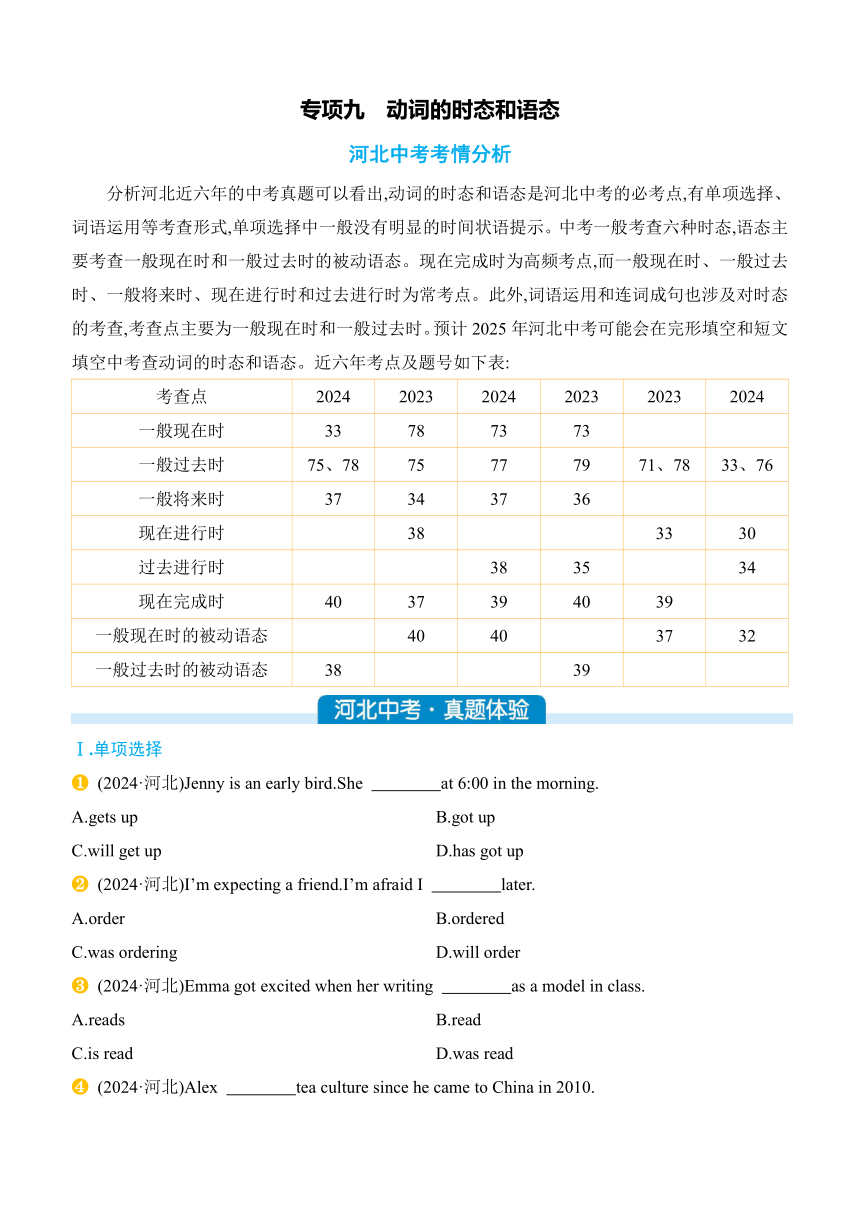 | |
| 格式 | docx | ||
| 文件大小 | 175.3KB | ||
| 资源类型 | 教案 | ||
| 版本资源 | 人教新目标(Go for it)版 | ||
| 科目 | 英语 | ||
| 更新时间 | 2024-12-02 09:21:11 | ||
图片预览

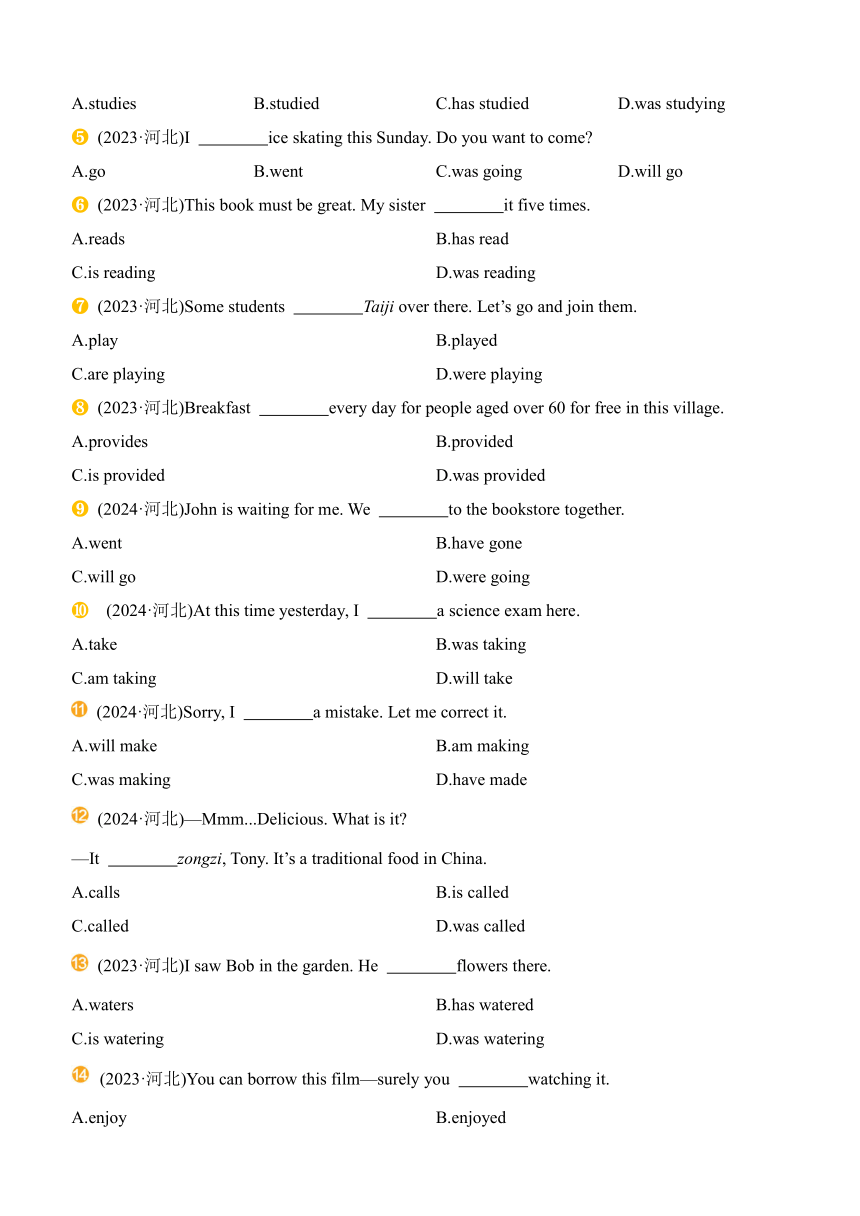
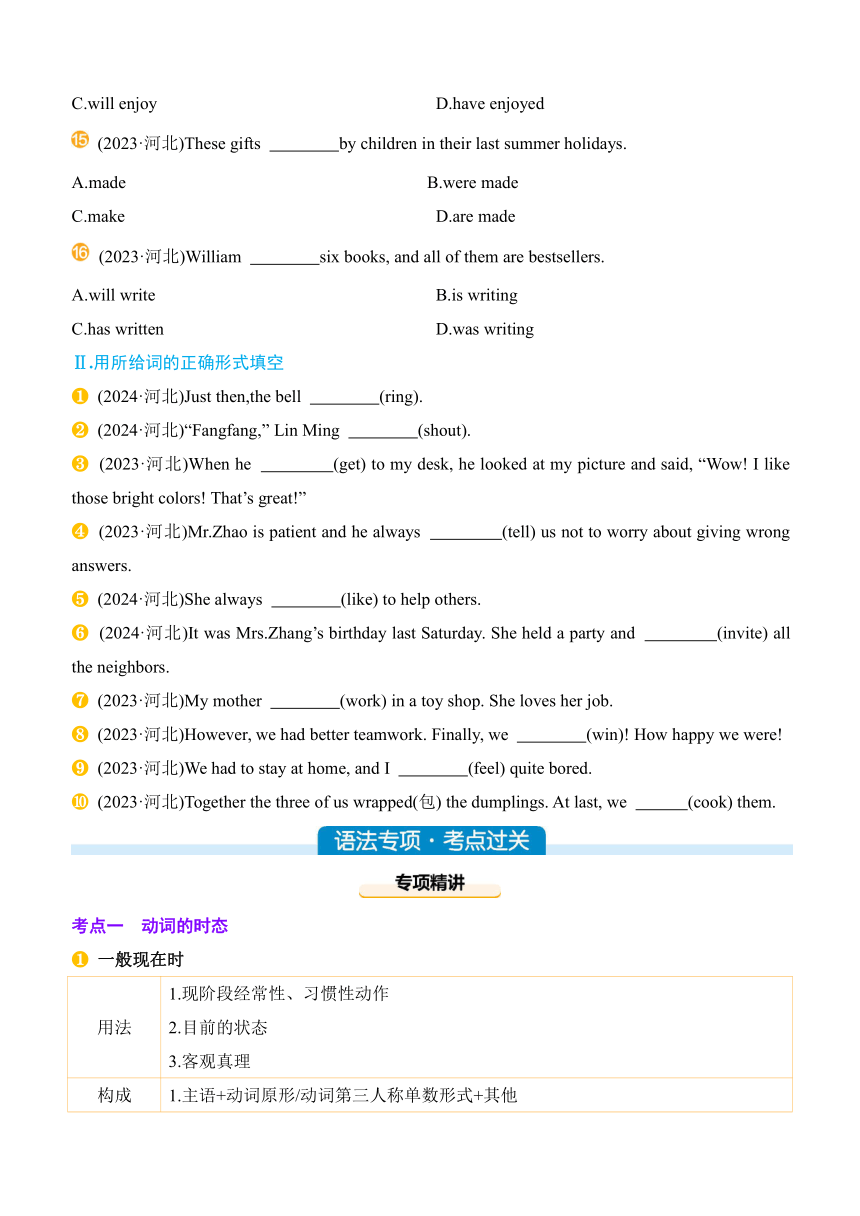
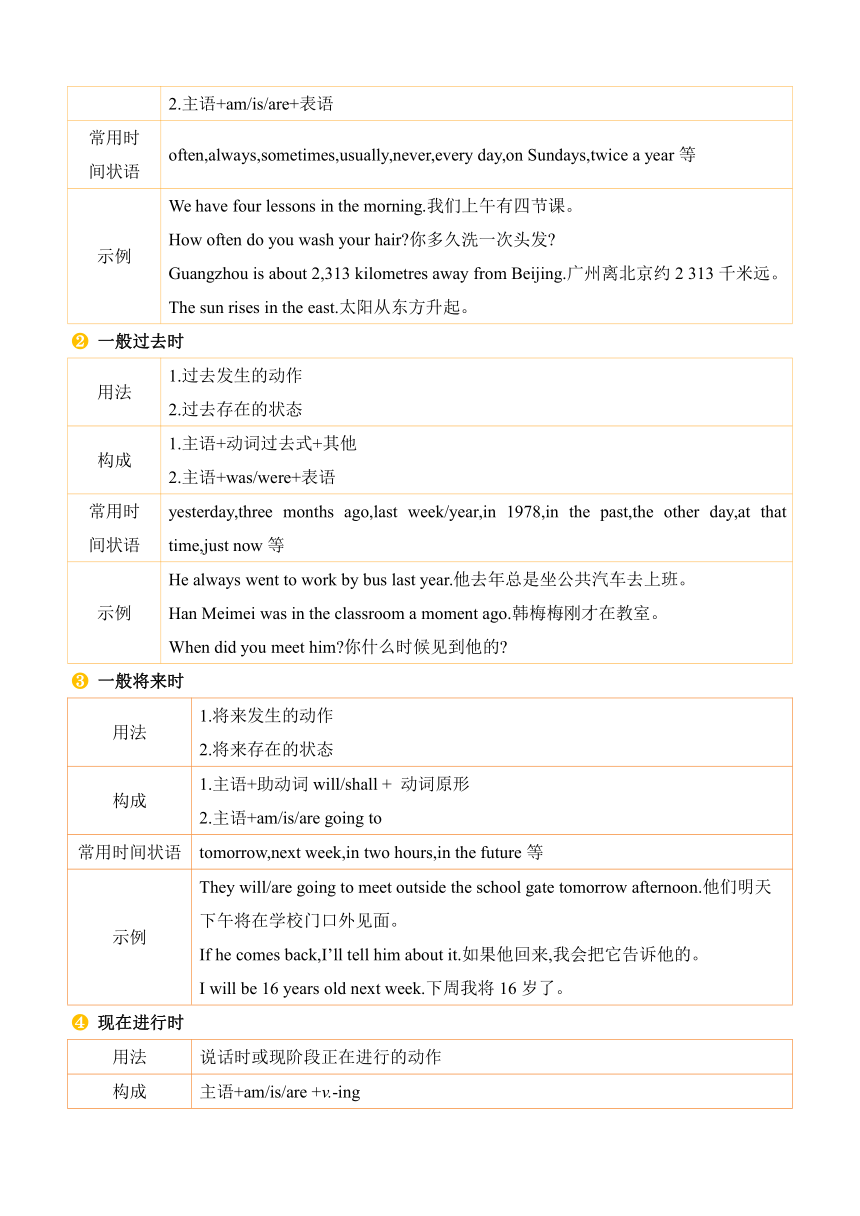
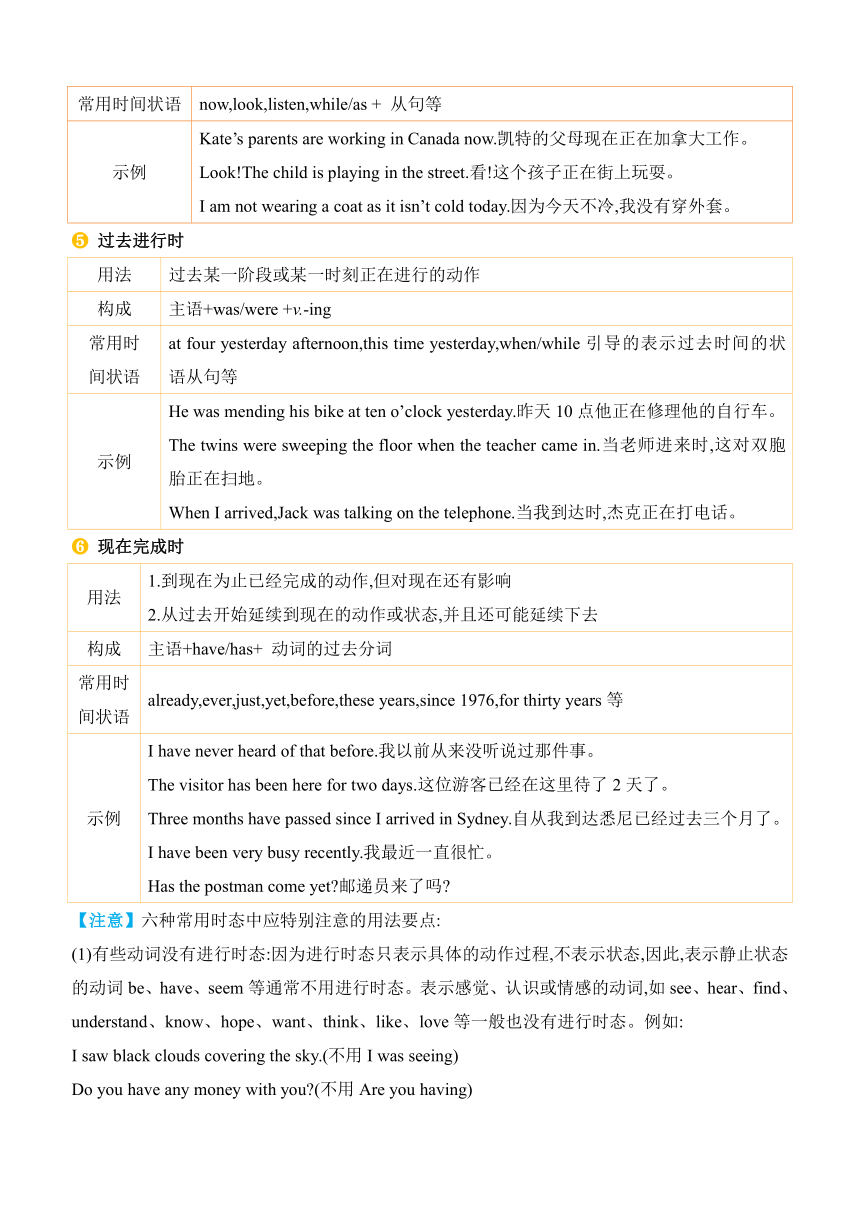
文档简介
专项九 动词的时态和语态
河北中考考情分析
分析河北近六年的中考真题可以看出,动词的时态和语态是河北中考的必考点,有单项选择、词语运用等考查形式,单项选择中一般没有明显的时间状语提示。中考一般考查六种时态,语态主要考查一般现在时和一般过去时的被动语态。现在完成时为高频考点,而一般现在时、一般过去时、一般将来时、现在进行时和过去进行时为常考点。此外,词语运用和连词成句也涉及对时态的考查,考查点主要为一般现在时和一般过去时。预计2025年河北中考可能会在完形填空和短文填空中考查动词的时态和语态。近六年考点及题号如下表:
考查点 2024 2023 2024 2023 2023 2024
一般现在时 33 78 73 73
一般过去时 75、78 75 77 79 71、78 33、76
一般将来时 37 34 37 36
现在进行时 38 33 30
过去进行时 38 35 34
现在完成时 40 37 39 40 39
一般现在时的被动语态 40 40 37 32
一般过去时的被动语态 38 39
Ⅰ.单项选择
(2024·河北)Jenny is an early bird.She at 6:00 in the morning.
A.gets up B.got up
C.will get up D.has got up
(2024·河北)I’m expecting a friend.I’m afraid I later.
A.order B.ordered
C.was ordering D.will order
(2024·河北)Emma got excited when her writing as a model in class.
A.reads B.read
C.is read D.was read
(2024·河北)Alex tea culture since he came to China in 2010.
A.studies B.studied C.has studied D.was studying
(2023·河北)I ice skating this Sunday. Do you want to come
A.go B.went C.was going D.will go
(2023·河北)This book must be great. My sister it five times.
A.reads B.has read
C.is reading D.was reading
(2023·河北)Some students Taiji over there. Let’s go and join them.
A.play B.played
C.are playing D.were playing
(2023·河北)Breakfast every day for people aged over 60 for free in this village.
A.provides B.provided
C.is provided D.was provided
(2024·河北)John is waiting for me. We to the bookstore together.
A.went B.have gone
C.will go D.were going
(2024·河北)At this time yesterday, I a science exam here.
A.take B.was taking
C.am taking D.will take
(2024·河北)Sorry, I a mistake. Let me correct it.
A.will make B.am making
C.was making D.have made
(2024·河北)—Mmm...Delicious. What is it
—It zongzi, Tony. It’s a traditional food in China.
A.calls B.is called
C.called D.was called
(2023·河北)I saw Bob in the garden. He flowers there.
A.waters B.has watered
C.is watering D.was watering
(2023·河北)You can borrow this film—surely you watching it.
A.enjoy B.enjoyed
C.will enjoy D.have enjoyed
(2023·河北)These gifts by children in their last summer holidays.
A.made B.were made
C.make D.are made
(2023·河北)William six books, and all of them are bestsellers.
A.will write B.is writing
C.has written D.was writing
Ⅱ.用所给词的正确形式填空
(2024·河北)Just then,the bell (ring).
(2024·河北)“Fangfang,” Lin Ming (shout).
(2023·河北)When he (get) to my desk, he looked at my picture and said, “Wow! I like those bright colors! That’s great!”
(2023·河北)Mr.Zhao is patient and he always (tell) us not to worry about giving wrong answers.
(2024·河北)She always (like) to help others.
(2024·河北)It was Mrs.Zhang’s birthday last Saturday. She held a party and (invite) all the neighbors.
(2023·河北)My mother (work) in a toy shop. She loves her job.
(2023·河北)However, we had better teamwork. Finally, we (win)! How happy we were!
(2023·河北)We had to stay at home, and I (feel) quite bored.
(2023·河北)Together the three of us wrapped(包) the dumplings. At last, we (cook) them.
考点一 动词的时态
一般现在时
用法 1.现阶段经常性、习惯性动作 2.目前的状态 3.客观真理
构成 1.主语+动词原形/动词第三人称单数形式+其他 2.主语+am/is/are+表语
常用时 间状语 often,always,sometimes,usually,never,every day,on Sundays,twice a year等
示例 We have four lessons in the morning.我们上午有四节课。 How often do you wash your hair 你多久洗一次头发 Guangzhou is about 2,313 kilometres away from Beijing.广州离北京约2 313千米远。 The sun rises in the east.太阳从东方升起。
一般过去时
用法 1.过去发生的动作 2.过去存在的状态
构成 1.主语+动词过去式+其他 2.主语+was/were+表语
常用时 间状语 yesterday,three months ago,last week/year,in 1978,in the past,the other day,at that time,just now等
示例 He always went to work by bus last year.他去年总是坐公共汽车去上班。 Han Meimei was in the classroom a moment ago.韩梅梅刚才在教室。 When did you meet him 你什么时候见到他的
一般将来时
用法 1.将来发生的动作 2.将来存在的状态
构成 1.主语+助动词will/shall + 动词原形 2.主语+am/is/are going to
常用时间状语 tomorrow,next week,in two hours,in the future等
示例 They will/are going to meet outside the school gate tomorrow afternoon.他们明天下午将在学校门口外见面。 If he comes back,I’ll tell him about it.如果他回来,我会把它告诉他的。 I will be 16 years old next week.下周我将16岁了。
现在进行时
用法 说话时或现阶段正在进行的动作
构成 主语+am/is/are +v.-ing
常用时间状语 now,look,listen,while/as + 从句等
示例 Kate’s parents are working in Canada now.凯特的父母现在正在加拿大工作。 Look!The child is playing in the street.看!这个孩子正在街上玩耍。 I am not wearing a coat as it isn’t cold today.因为今天不冷,我没有穿外套。
过去进行时
用法 过去某一阶段或某一时刻正在进行的动作
构成 主语+was/were +v.-ing
常用时 间状语 at four yesterday afternoon,this time yesterday,when/while引导的表示过去时间的状语从句等
示例 He was mending his bike at ten o’clock yesterday.昨天10点他正在修理他的自行车。 The twins were sweeping the floor when the teacher came in.当老师进来时,这对双胞胎正在扫地。 When I arrived,Jack was talking on the telephone.当我到达时,杰克正在打电话。
现在完成时
用法 1.到现在为止已经完成的动作,但对现在还有影响 2.从过去开始延续到现在的动作或状态,并且还可能延续下去
构成 主语+have/has+ 动词的过去分词
常用时 间状语 already,ever,just,yet,before,these years,since 1976,for thirty years等
示例 I have never heard of that before.我以前从来没听说过那件事。 The visitor has been here for two days.这位游客已经在这里待了2天了。 Three months have passed since I arrived in Sydney.自从我到达悉尼已经过去三个月了。 I have been very busy recently.我最近一直很忙。 Has the postman come yet 邮递员来了吗
【注意】六种常用时态中应特别注意的用法要点:
(1)有些动词没有进行时态:因为进行时态只表示具体的动作过程,不表示状态,因此,表示静止状态的动词be、have、seem等通常不用进行时态。表示感觉、认识或情感的动词,如see、hear、find、understand、know、hope、want、think、like、love等一般也没有进行时态。例如:
I saw black clouds covering the sky.(不用I was seeing)
Do you have any money with you (不用Are you having)
(2)用进行时表示将来发生的动作:有少数动词可以用现在进行时来表示不久即将发生的动作,用过去进行时表示在过去预料不久即将发生的动作,这些动词是指从一个状态或位置转移到另一个状态或位置的过渡性的动态动词,如go、come、leave、arrive、return、start、begin等。例如:
My brother is leaving for Canada next week.
She asked whether Tom was starting the next day.
(3)延续性动词与非延续性动词:有些动词表示一个延续的状态,叫延续性动词,如live、study、work、be等;有些动词只能表示一个短暂的动作,叫非延续性动词,如come、go、begin、join等。延续性动词可以和表示一段时间或持续状态的短语连用;非延续性动词一般不和表示一段时间或持续状态的短语连用。例如:
他入团三年了。
He has joined the Youth League for three years.(×)
He has joined the Youth League since 2024.(×)
He has been a member of the Youth League for three years.(√)
It is three years since he joined the Youth League.(√)
(4)一般过去时与现在完成时的区别:一般过去时和现在完成时都表示过去发生的事情,但两者的着重点不同。一般过去时只表示过去发生的事情本身,不涉及与现在的关系;现在完成时则强调过去发生的某事对现在造成的影响,主要说明现在的情况。比较下列句子:
Who has opened the door 谁把门打开了 (现在门还开着)
Who opened the door 谁开的门 (指过去,与现在无关,现在门是关着还是开着,没有说明。)
“have gone to”与“have been to”的区别:“have gone to”指“到某地去了,现在还在那里”;“have been to”表示“去过某地,但现在已离开那里或已经回来”。比较下列句子:
Have you ever been to Tokyo 你去过东京吗
—Is Lily in Paris ——莉莉在巴黎吗
—No,she isn’t.She has gone to London.——不,她不在。她已经到伦敦去了。
Ted (begin) reading at two,and by four,he had known a lot about many subjects from astronomy to zoology(动物学).
—Have you watched the film Gulliver’s Travels
—Yes.I (watch)it during the Spring Festival.What about you
Jack is a good learner because he always (consider) what he needs to learn with something interesting.
—Do you know where your brother is,Mark
—Sorry.I (think) about a question and didn’t hear what you had said.
—What’s that terrible noise
—It’s John.He (practice) the violin.
If I’m available tomorrow afternoon,I (visit) the city museum with my brother.
But surely,people believe,his dream (come) true in the near future.
They (raise) more than $100 million over the past years,according to the news website Genius.
—Our computer is working again!
—Yes.Our IT teacher (fix) it.It took him about an hour.
He (ride) home after he had a quick supper in the restaurant near the hospital.
—Can Peter play games with us,Mrs.Hawking
—Wait a minute.He (take) a shower.
—My father and I (take)a lot of photos at the same place in the past ten years.
—Those photos must be your valuable memories.
考点二 动词的语态
被动语态的构成
时态 被动语态 示例
一般 现在时 am/is/are+动词过去分词 The room is cleaned(by her) every day.房间每天都(由她)打扫。
一般 过去时 was/were+动词过去分词 My car was stolen last night.我的车昨晚被偷了。
一般 将来时 will/shall(第一人称)+be+动词过去分词 Some trees will be planted this week.本周将会种一些树。
现在 完成时 have/has been+动词过去分词 The task has been finished by them.任务已经被他们完成了。
含情 态动词 情态动词+be+动词过去分词 Wasted paper shou-ldn’t be thrown here.废纸不应该被扔在这里。
主动语态变被动语态的方法
【注意】主动语态中有些感官动词(如hear、see、watch、notice等)和使役动词(如make、let等)后用不带to的动词不定式作宾语补足语,变为被动语态时,要把动词不定式符号to还原。例如:
hear/see sb.do sth.→sb.be heard/seen to do sth.
make sb.do sth.→sb.be made to do sth.
使用被动语态的情况
(1)不知道动作的执行者是谁。
Rice is grown in the south of China.中国南方种植水稻。
(2)没有必要指出动作的执行者。
Smoking isn’t allowed in the gas station.加油站里不允许吸烟。
(3)需要强调和突出动作的承受者。
The new machine was invented by a young worker.这台新机器是一个年轻的工人发明的。
(4)句子的主语是物。
Many houses were washed away by the flood.许多房屋被洪水冲走了。
主动结构表示被动意义的情况
(1)open、lock、write、read、sell、clean、watch、cut、burn、drive等词作不及物动词时,当它们的主语为物时,可用主动结构表示被动意义。
This kind of pen writes very smoothly.这种钢笔写起来很流畅。
(2)look、sound、taste、smell等感官动词用主动结构表示被动意义。
Mooncakes taste very delicious.月饼尝起来很好吃。
(3)be worth doing用主动形式表示被动意义。
This book is worth reading.这本书值得一读。
(4)“want/need/require+doing”相当于“want/need/require+to be done”,to be done为动词不定式的被动结构。
Your car needs washing.=Your car needs to be washed.你的汽车需要清洗了。
—Simon,do you know who invented the kite
—Sure!It (invent)by Mozi over 2,000 years ago.
—Can you go to the movies with me tonight
—I have to ask my mom.If I (allow),I will go with you.
Computers have had a great influence on learning methods since they (introduce) into schools.
We are fixing the windows in Classroom 6.The work (expect) to take a couple of weeks.
People throw away many things that they don’t need anymore.Actually these things can
(put) to good use.
—What language (speak) in Germany
—Most people speak German,but many can speak English,too.
—Don’t smoke here,Dad.Smoking (not allow) in public places.
—Oh,sorry.I’ll stop right now.
He hardly listened or tried hard in class.Talking was so much fun.He wanted to (hear) rather than listen.
Dr.Morris was busy the whole day.The last operation(手术) (not finish) until half past eight.
—Can you sing this English song
—Of course,I can.It (teach) many times on the radio.
We’re sure that the environment in our city (improve) greatly through our work in the near future.
Some photos of the moon (show) in the Space Club next week.
Ⅰ.用所给词的正确形式填空
You (expect) to be more organized in high school. So you can keep a diary.
—Jim isn’t in the classroom.Where is he now
—He (go) to the library.
Most of the rubbish in this town (recycle) every day through a rainbow recycling system.
We (not see) each other since I came to Changsha,but we often send emails.
Mr.Green (work) in our school ten years ago.
My grandpa (watch) TV when I got home at 6 o’clock yesterday afternoon.
Fan Jinshi (do) a lot to protect Dunhuang culture for many years.
In the coming summer vacation, I (attend) a DIY course.
By the time the police arrived,the man (save) the little girl.
Ⅱ.根据汉语意思完成句子
她经常编故事来逗她的孩子笑。
She often stories to make her kid laugh.
康康许了一个愿,然后他吹灭了蜡烛。
Kangkang ,and then he blew out the candles.
如果明天不下雨,操场上将有一场英语演讲。
There an English speech
on the playground if it tomorrow.
鸟儿们正发出美妙动听的叫声。
The birds beautiful sounds.
Ⅲ.短文填空
When May Day comes,it means that people 1.(have) several vacation days.Are you sorry for not traveling during the vacation this year If you stayed at home,I think you 2.(make) a good choice.Why Because there were a lot of people in many places of interest in China.These places
3.(be) crowded with people.
It was 4.(report) that there were over 100,000 people on Mount Tai on May 1st,2023.You couldn’t take photos for you or your friends.You even 5.(have) no place to rest.A friend of mine told me he 6.(can) see nothing except lots of people on Mount Tai.“We couldn’t walk if the people in front of us didn’t walk,” he said.He showed me a photo taken on Mount Tai.In the photo,I hardly 7.(find) him,because there were so many people.
So some people 8.(advice) that we should just stay at home to avoid too many people.However,other people 9.(agree) with them.They think it’s exciting to go traveling.I love staying at home more than 10.(travel).What’s your idea
【详解答案】
河北中考·真题体验
Ⅰ.1.A 解析:句意:珍妮是个早起的人。她早上6点起床。根据“She...at 6:00 in the morning.”可知,此处强调经常性的动作,用一般现在时。故选A。
2.D 解析:句意:我在等一个朋友。恐怕我要晚点儿点餐。根据“I’m expecting a friend.I’m afraid I...later.”可知,因为在等朋友,所以要晚点儿点餐,应用一般将来时。故选D。
3.D 解析:句意:当艾玛的作文在课堂上被当作范文朗读时,她很兴奋。从句主语是动作的承受者,结合“Emma got excited”可知,动作发生在过去,所以用一般过去时的被动语态。故选D。
4.C 解析:句意:Alex自从2010年来到中国就开始研究茶文化。根据“Alex...tea culture since he came to China in 2010.”可知,此处强调时间的延续,是“现在完成时+since+一般过去时”结构,应用现在完成时。故选C。
5.D 解析:句意:我这个星期天要去滑冰。你想来吗 根据“Do you want to come ”可知,动作还未发生,应用一般将来时。故选D。
6.B 解析:句意:这本书一定很棒。我妹妹读了五遍。根据“five times”可知,此处强调动作已经完成的次数,用现在完成时。故选B。
7.C 解析:句意:一些学生正在那边打太极。我们去加入他们吧。根据“Let’s go and join them.”可知,他们正在打太极,应用现在进行时。故选C。
8.C 解析:句意:这个村子每天为60岁以上的老人免费提供早餐。本句主语Breakfast是动作provide的承受者,应用被动语态;根据“every day”可知,用一般现在时,所以用一般现在时的被动语态。故选C。
9.C 解析:句意:约翰在等我。我们将一起去书店。根据语境可知,二人将要一起去书店,用一般将来时。故选C。
10.B 解析:句意:昨天这个时候,我正在这里参加科学考试。根据“At this time yesterday”可知,此处描述过去某个时刻正在发生的动作,应用过去进行时。故选B。
11.D 解析:句意:对不起,我弄错了。让我纠正一下。根据“Let me correct it.”可知,错误已经犯了,且对现在造成了影响,用现在完成时。故选D。
12.B 解析:句意:——嗯……好吃。这是什么 ——它叫粽子,托尼。这是中国的一种传统食物。根据“What is it ”可知,此处回答使用一般现在时,It指代询问的这个东西,与动词call之间为动宾关系,应用被动语态。故选B。
13.D 解析:句意:我在花园里看见鲍勃了。他在那里浇花。根据“I saw Bob in the garden.”可知,此处强调在过去的某个时间点正在发生的动作,用过去进行时。故选D。
14.C 解析:句意:你可以借这部电影——你一定会喜欢看的。分析“You can borrow this film”可知,此时动作还未发生,用一般将来时。故选C。
15.B 解析:句意:这些礼物是孩子们在上一个暑假里做的。主语gifts与动词make之间为动宾关系,应用被动语态;且根据“last summer holidays”可知,句子应用一般过去时,故空格处应用一般过去时的被动语态。故选B。
16.C 解析:句意:威廉写了六本书了,它们都是畅销书。根据语境可知,此处强调动作已经完成,用现在完成时。故选C。
Ⅱ.1.rang 2.shouted 3.got 4.tells 5.likes 6.invited 7.works 8.won 9.felt 10.cooked
语法专项·考点过关
专项精讲
考点一:
针对训练
1.began 2.watched 3.considers
4.was thinking 5.is practicing
6.will/am going to visit 7.will come 8.have raised 9.has fixed 10.rode 11.is taking 12.have taken
考点二:
针对训练
1.was invented 2.am allowed 3.were introduced 4.is expected 5.be put
6.is spoken 7.isn’t allowed 8.be heard
9.wasn’t finished 10.has been taught 11.will be improved 12.will be shown
专项精练
Ⅰ.1.are expected 2.has gone
3.is recycled 4.haven’t seen
5.worked 6.was watching
7.has done 8.will attend
9.had saved
Ⅱ.1.makes up 2.made a wish
3.will be;doesn’t rain 4.are making
Ⅲ.1.will have 2.made 3.were
4.reported 5.had 6.could
7.found 8.advise 9.disagree
10.travelling/traveling
河北中考考情分析
分析河北近六年的中考真题可以看出,动词的时态和语态是河北中考的必考点,有单项选择、词语运用等考查形式,单项选择中一般没有明显的时间状语提示。中考一般考查六种时态,语态主要考查一般现在时和一般过去时的被动语态。现在完成时为高频考点,而一般现在时、一般过去时、一般将来时、现在进行时和过去进行时为常考点。此外,词语运用和连词成句也涉及对时态的考查,考查点主要为一般现在时和一般过去时。预计2025年河北中考可能会在完形填空和短文填空中考查动词的时态和语态。近六年考点及题号如下表:
考查点 2024 2023 2024 2023 2023 2024
一般现在时 33 78 73 73
一般过去时 75、78 75 77 79 71、78 33、76
一般将来时 37 34 37 36
现在进行时 38 33 30
过去进行时 38 35 34
现在完成时 40 37 39 40 39
一般现在时的被动语态 40 40 37 32
一般过去时的被动语态 38 39
Ⅰ.单项选择
(2024·河北)Jenny is an early bird.She at 6:00 in the morning.
A.gets up B.got up
C.will get up D.has got up
(2024·河北)I’m expecting a friend.I’m afraid I later.
A.order B.ordered
C.was ordering D.will order
(2024·河北)Emma got excited when her writing as a model in class.
A.reads B.read
C.is read D.was read
(2024·河北)Alex tea culture since he came to China in 2010.
A.studies B.studied C.has studied D.was studying
(2023·河北)I ice skating this Sunday. Do you want to come
A.go B.went C.was going D.will go
(2023·河北)This book must be great. My sister it five times.
A.reads B.has read
C.is reading D.was reading
(2023·河北)Some students Taiji over there. Let’s go and join them.
A.play B.played
C.are playing D.were playing
(2023·河北)Breakfast every day for people aged over 60 for free in this village.
A.provides B.provided
C.is provided D.was provided
(2024·河北)John is waiting for me. We to the bookstore together.
A.went B.have gone
C.will go D.were going
(2024·河北)At this time yesterday, I a science exam here.
A.take B.was taking
C.am taking D.will take
(2024·河北)Sorry, I a mistake. Let me correct it.
A.will make B.am making
C.was making D.have made
(2024·河北)—Mmm...Delicious. What is it
—It zongzi, Tony. It’s a traditional food in China.
A.calls B.is called
C.called D.was called
(2023·河北)I saw Bob in the garden. He flowers there.
A.waters B.has watered
C.is watering D.was watering
(2023·河北)You can borrow this film—surely you watching it.
A.enjoy B.enjoyed
C.will enjoy D.have enjoyed
(2023·河北)These gifts by children in their last summer holidays.
A.made B.were made
C.make D.are made
(2023·河北)William six books, and all of them are bestsellers.
A.will write B.is writing
C.has written D.was writing
Ⅱ.用所给词的正确形式填空
(2024·河北)Just then,the bell (ring).
(2024·河北)“Fangfang,” Lin Ming (shout).
(2023·河北)When he (get) to my desk, he looked at my picture and said, “Wow! I like those bright colors! That’s great!”
(2023·河北)Mr.Zhao is patient and he always (tell) us not to worry about giving wrong answers.
(2024·河北)She always (like) to help others.
(2024·河北)It was Mrs.Zhang’s birthday last Saturday. She held a party and (invite) all the neighbors.
(2023·河北)My mother (work) in a toy shop. She loves her job.
(2023·河北)However, we had better teamwork. Finally, we (win)! How happy we were!
(2023·河北)We had to stay at home, and I (feel) quite bored.
(2023·河北)Together the three of us wrapped(包) the dumplings. At last, we (cook) them.
考点一 动词的时态
一般现在时
用法 1.现阶段经常性、习惯性动作 2.目前的状态 3.客观真理
构成 1.主语+动词原形/动词第三人称单数形式+其他 2.主语+am/is/are+表语
常用时 间状语 often,always,sometimes,usually,never,every day,on Sundays,twice a year等
示例 We have four lessons in the morning.我们上午有四节课。 How often do you wash your hair 你多久洗一次头发 Guangzhou is about 2,313 kilometres away from Beijing.广州离北京约2 313千米远。 The sun rises in the east.太阳从东方升起。
一般过去时
用法 1.过去发生的动作 2.过去存在的状态
构成 1.主语+动词过去式+其他 2.主语+was/were+表语
常用时 间状语 yesterday,three months ago,last week/year,in 1978,in the past,the other day,at that time,just now等
示例 He always went to work by bus last year.他去年总是坐公共汽车去上班。 Han Meimei was in the classroom a moment ago.韩梅梅刚才在教室。 When did you meet him 你什么时候见到他的
一般将来时
用法 1.将来发生的动作 2.将来存在的状态
构成 1.主语+助动词will/shall + 动词原形 2.主语+am/is/are going to
常用时间状语 tomorrow,next week,in two hours,in the future等
示例 They will/are going to meet outside the school gate tomorrow afternoon.他们明天下午将在学校门口外见面。 If he comes back,I’ll tell him about it.如果他回来,我会把它告诉他的。 I will be 16 years old next week.下周我将16岁了。
现在进行时
用法 说话时或现阶段正在进行的动作
构成 主语+am/is/are +v.-ing
常用时间状语 now,look,listen,while/as + 从句等
示例 Kate’s parents are working in Canada now.凯特的父母现在正在加拿大工作。 Look!The child is playing in the street.看!这个孩子正在街上玩耍。 I am not wearing a coat as it isn’t cold today.因为今天不冷,我没有穿外套。
过去进行时
用法 过去某一阶段或某一时刻正在进行的动作
构成 主语+was/were +v.-ing
常用时 间状语 at four yesterday afternoon,this time yesterday,when/while引导的表示过去时间的状语从句等
示例 He was mending his bike at ten o’clock yesterday.昨天10点他正在修理他的自行车。 The twins were sweeping the floor when the teacher came in.当老师进来时,这对双胞胎正在扫地。 When I arrived,Jack was talking on the telephone.当我到达时,杰克正在打电话。
现在完成时
用法 1.到现在为止已经完成的动作,但对现在还有影响 2.从过去开始延续到现在的动作或状态,并且还可能延续下去
构成 主语+have/has+ 动词的过去分词
常用时 间状语 already,ever,just,yet,before,these years,since 1976,for thirty years等
示例 I have never heard of that before.我以前从来没听说过那件事。 The visitor has been here for two days.这位游客已经在这里待了2天了。 Three months have passed since I arrived in Sydney.自从我到达悉尼已经过去三个月了。 I have been very busy recently.我最近一直很忙。 Has the postman come yet 邮递员来了吗
【注意】六种常用时态中应特别注意的用法要点:
(1)有些动词没有进行时态:因为进行时态只表示具体的动作过程,不表示状态,因此,表示静止状态的动词be、have、seem等通常不用进行时态。表示感觉、认识或情感的动词,如see、hear、find、understand、know、hope、want、think、like、love等一般也没有进行时态。例如:
I saw black clouds covering the sky.(不用I was seeing)
Do you have any money with you (不用Are you having)
(2)用进行时表示将来发生的动作:有少数动词可以用现在进行时来表示不久即将发生的动作,用过去进行时表示在过去预料不久即将发生的动作,这些动词是指从一个状态或位置转移到另一个状态或位置的过渡性的动态动词,如go、come、leave、arrive、return、start、begin等。例如:
My brother is leaving for Canada next week.
She asked whether Tom was starting the next day.
(3)延续性动词与非延续性动词:有些动词表示一个延续的状态,叫延续性动词,如live、study、work、be等;有些动词只能表示一个短暂的动作,叫非延续性动词,如come、go、begin、join等。延续性动词可以和表示一段时间或持续状态的短语连用;非延续性动词一般不和表示一段时间或持续状态的短语连用。例如:
他入团三年了。
He has joined the Youth League for three years.(×)
He has joined the Youth League since 2024.(×)
He has been a member of the Youth League for three years.(√)
It is three years since he joined the Youth League.(√)
(4)一般过去时与现在完成时的区别:一般过去时和现在完成时都表示过去发生的事情,但两者的着重点不同。一般过去时只表示过去发生的事情本身,不涉及与现在的关系;现在完成时则强调过去发生的某事对现在造成的影响,主要说明现在的情况。比较下列句子:
Who has opened the door 谁把门打开了 (现在门还开着)
Who opened the door 谁开的门 (指过去,与现在无关,现在门是关着还是开着,没有说明。)
“have gone to”与“have been to”的区别:“have gone to”指“到某地去了,现在还在那里”;“have been to”表示“去过某地,但现在已离开那里或已经回来”。比较下列句子:
Have you ever been to Tokyo 你去过东京吗
—Is Lily in Paris ——莉莉在巴黎吗
—No,she isn’t.She has gone to London.——不,她不在。她已经到伦敦去了。
Ted (begin) reading at two,and by four,he had known a lot about many subjects from astronomy to zoology(动物学).
—Have you watched the film Gulliver’s Travels
—Yes.I (watch)it during the Spring Festival.What about you
Jack is a good learner because he always (consider) what he needs to learn with something interesting.
—Do you know where your brother is,Mark
—Sorry.I (think) about a question and didn’t hear what you had said.
—What’s that terrible noise
—It’s John.He (practice) the violin.
If I’m available tomorrow afternoon,I (visit) the city museum with my brother.
But surely,people believe,his dream (come) true in the near future.
They (raise) more than $100 million over the past years,according to the news website Genius.
—Our computer is working again!
—Yes.Our IT teacher (fix) it.It took him about an hour.
He (ride) home after he had a quick supper in the restaurant near the hospital.
—Can Peter play games with us,Mrs.Hawking
—Wait a minute.He (take) a shower.
—My father and I (take)a lot of photos at the same place in the past ten years.
—Those photos must be your valuable memories.
考点二 动词的语态
被动语态的构成
时态 被动语态 示例
一般 现在时 am/is/are+动词过去分词 The room is cleaned(by her) every day.房间每天都(由她)打扫。
一般 过去时 was/were+动词过去分词 My car was stolen last night.我的车昨晚被偷了。
一般 将来时 will/shall(第一人称)+be+动词过去分词 Some trees will be planted this week.本周将会种一些树。
现在 完成时 have/has been+动词过去分词 The task has been finished by them.任务已经被他们完成了。
含情 态动词 情态动词+be+动词过去分词 Wasted paper shou-ldn’t be thrown here.废纸不应该被扔在这里。
主动语态变被动语态的方法
【注意】主动语态中有些感官动词(如hear、see、watch、notice等)和使役动词(如make、let等)后用不带to的动词不定式作宾语补足语,变为被动语态时,要把动词不定式符号to还原。例如:
hear/see sb.do sth.→sb.be heard/seen to do sth.
make sb.do sth.→sb.be made to do sth.
使用被动语态的情况
(1)不知道动作的执行者是谁。
Rice is grown in the south of China.中国南方种植水稻。
(2)没有必要指出动作的执行者。
Smoking isn’t allowed in the gas station.加油站里不允许吸烟。
(3)需要强调和突出动作的承受者。
The new machine was invented by a young worker.这台新机器是一个年轻的工人发明的。
(4)句子的主语是物。
Many houses were washed away by the flood.许多房屋被洪水冲走了。
主动结构表示被动意义的情况
(1)open、lock、write、read、sell、clean、watch、cut、burn、drive等词作不及物动词时,当它们的主语为物时,可用主动结构表示被动意义。
This kind of pen writes very smoothly.这种钢笔写起来很流畅。
(2)look、sound、taste、smell等感官动词用主动结构表示被动意义。
Mooncakes taste very delicious.月饼尝起来很好吃。
(3)be worth doing用主动形式表示被动意义。
This book is worth reading.这本书值得一读。
(4)“want/need/require+doing”相当于“want/need/require+to be done”,to be done为动词不定式的被动结构。
Your car needs washing.=Your car needs to be washed.你的汽车需要清洗了。
—Simon,do you know who invented the kite
—Sure!It (invent)by Mozi over 2,000 years ago.
—Can you go to the movies with me tonight
—I have to ask my mom.If I (allow),I will go with you.
Computers have had a great influence on learning methods since they (introduce) into schools.
We are fixing the windows in Classroom 6.The work (expect) to take a couple of weeks.
People throw away many things that they don’t need anymore.Actually these things can
(put) to good use.
—What language (speak) in Germany
—Most people speak German,but many can speak English,too.
—Don’t smoke here,Dad.Smoking (not allow) in public places.
—Oh,sorry.I’ll stop right now.
He hardly listened or tried hard in class.Talking was so much fun.He wanted to (hear) rather than listen.
Dr.Morris was busy the whole day.The last operation(手术) (not finish) until half past eight.
—Can you sing this English song
—Of course,I can.It (teach) many times on the radio.
We’re sure that the environment in our city (improve) greatly through our work in the near future.
Some photos of the moon (show) in the Space Club next week.
Ⅰ.用所给词的正确形式填空
You (expect) to be more organized in high school. So you can keep a diary.
—Jim isn’t in the classroom.Where is he now
—He (go) to the library.
Most of the rubbish in this town (recycle) every day through a rainbow recycling system.
We (not see) each other since I came to Changsha,but we often send emails.
Mr.Green (work) in our school ten years ago.
My grandpa (watch) TV when I got home at 6 o’clock yesterday afternoon.
Fan Jinshi (do) a lot to protect Dunhuang culture for many years.
In the coming summer vacation, I (attend) a DIY course.
By the time the police arrived,the man (save) the little girl.
Ⅱ.根据汉语意思完成句子
她经常编故事来逗她的孩子笑。
She often stories to make her kid laugh.
康康许了一个愿,然后他吹灭了蜡烛。
Kangkang ,and then he blew out the candles.
如果明天不下雨,操场上将有一场英语演讲。
There an English speech
on the playground if it tomorrow.
鸟儿们正发出美妙动听的叫声。
The birds beautiful sounds.
Ⅲ.短文填空
When May Day comes,it means that people 1.(have) several vacation days.Are you sorry for not traveling during the vacation this year If you stayed at home,I think you 2.(make) a good choice.Why Because there were a lot of people in many places of interest in China.These places
3.(be) crowded with people.
It was 4.(report) that there were over 100,000 people on Mount Tai on May 1st,2023.You couldn’t take photos for you or your friends.You even 5.(have) no place to rest.A friend of mine told me he 6.(can) see nothing except lots of people on Mount Tai.“We couldn’t walk if the people in front of us didn’t walk,” he said.He showed me a photo taken on Mount Tai.In the photo,I hardly 7.(find) him,because there were so many people.
So some people 8.(advice) that we should just stay at home to avoid too many people.However,other people 9.(agree) with them.They think it’s exciting to go traveling.I love staying at home more than 10.(travel).What’s your idea
【详解答案】
河北中考·真题体验
Ⅰ.1.A 解析:句意:珍妮是个早起的人。她早上6点起床。根据“She...at 6:00 in the morning.”可知,此处强调经常性的动作,用一般现在时。故选A。
2.D 解析:句意:我在等一个朋友。恐怕我要晚点儿点餐。根据“I’m expecting a friend.I’m afraid I...later.”可知,因为在等朋友,所以要晚点儿点餐,应用一般将来时。故选D。
3.D 解析:句意:当艾玛的作文在课堂上被当作范文朗读时,她很兴奋。从句主语是动作的承受者,结合“Emma got excited”可知,动作发生在过去,所以用一般过去时的被动语态。故选D。
4.C 解析:句意:Alex自从2010年来到中国就开始研究茶文化。根据“Alex...tea culture since he came to China in 2010.”可知,此处强调时间的延续,是“现在完成时+since+一般过去时”结构,应用现在完成时。故选C。
5.D 解析:句意:我这个星期天要去滑冰。你想来吗 根据“Do you want to come ”可知,动作还未发生,应用一般将来时。故选D。
6.B 解析:句意:这本书一定很棒。我妹妹读了五遍。根据“five times”可知,此处强调动作已经完成的次数,用现在完成时。故选B。
7.C 解析:句意:一些学生正在那边打太极。我们去加入他们吧。根据“Let’s go and join them.”可知,他们正在打太极,应用现在进行时。故选C。
8.C 解析:句意:这个村子每天为60岁以上的老人免费提供早餐。本句主语Breakfast是动作provide的承受者,应用被动语态;根据“every day”可知,用一般现在时,所以用一般现在时的被动语态。故选C。
9.C 解析:句意:约翰在等我。我们将一起去书店。根据语境可知,二人将要一起去书店,用一般将来时。故选C。
10.B 解析:句意:昨天这个时候,我正在这里参加科学考试。根据“At this time yesterday”可知,此处描述过去某个时刻正在发生的动作,应用过去进行时。故选B。
11.D 解析:句意:对不起,我弄错了。让我纠正一下。根据“Let me correct it.”可知,错误已经犯了,且对现在造成了影响,用现在完成时。故选D。
12.B 解析:句意:——嗯……好吃。这是什么 ——它叫粽子,托尼。这是中国的一种传统食物。根据“What is it ”可知,此处回答使用一般现在时,It指代询问的这个东西,与动词call之间为动宾关系,应用被动语态。故选B。
13.D 解析:句意:我在花园里看见鲍勃了。他在那里浇花。根据“I saw Bob in the garden.”可知,此处强调在过去的某个时间点正在发生的动作,用过去进行时。故选D。
14.C 解析:句意:你可以借这部电影——你一定会喜欢看的。分析“You can borrow this film”可知,此时动作还未发生,用一般将来时。故选C。
15.B 解析:句意:这些礼物是孩子们在上一个暑假里做的。主语gifts与动词make之间为动宾关系,应用被动语态;且根据“last summer holidays”可知,句子应用一般过去时,故空格处应用一般过去时的被动语态。故选B。
16.C 解析:句意:威廉写了六本书了,它们都是畅销书。根据语境可知,此处强调动作已经完成,用现在完成时。故选C。
Ⅱ.1.rang 2.shouted 3.got 4.tells 5.likes 6.invited 7.works 8.won 9.felt 10.cooked
语法专项·考点过关
专项精讲
考点一:
针对训练
1.began 2.watched 3.considers
4.was thinking 5.is practicing
6.will/am going to visit 7.will come 8.have raised 9.has fixed 10.rode 11.is taking 12.have taken
考点二:
针对训练
1.was invented 2.am allowed 3.were introduced 4.is expected 5.be put
6.is spoken 7.isn’t allowed 8.be heard
9.wasn’t finished 10.has been taught 11.will be improved 12.will be shown
专项精练
Ⅰ.1.are expected 2.has gone
3.is recycled 4.haven’t seen
5.worked 6.was watching
7.has done 8.will attend
9.had saved
Ⅱ.1.makes up 2.made a wish
3.will be;doesn’t rain 4.are making
Ⅲ.1.will have 2.made 3.were
4.reported 5.had 6.could
7.found 8.advise 9.disagree
10.travelling/traveling
同课章节目录
- 词法
- 名词
- 动词和动词短语
- 动词语态
- 动词时态
- 助动词和情态动词
- 非谓语动词
- 冠词
- 代词
- 数词和量词
- 形容词副词及其比较等级
- 介词和介词短语
- 连词和感叹词
- 构词法
- 相似、相近词比较
- 句法
- 陈述句
- 一般疑问句和否定疑问句
- 特殊疑问句及选择疑问句
- 反意疑问句
- 存在句(There be句型)
- 宾语从句
- 定语从句
- 状语从句
- 主谓一致问题
- 简单句
- 并列句
- 复合句
- 主谓一致
- 主、表语从句
- 名词性从句
- 直接引语和间接引语
- 虚拟语气
- 感叹句
- 强调句
- 倒装句
- 祈使句
- 句子的成分
- 句子的分类
- 题型专区
- 单项选择部分
- 易错题
- 完形填空
- 阅读理解
- 词汇练习
- 听说训练
- 句型转换
- 补全对话
- 短文改错
- 翻译
- 书面表达
- 任务型阅读
- 语法填空
- 其他资料
